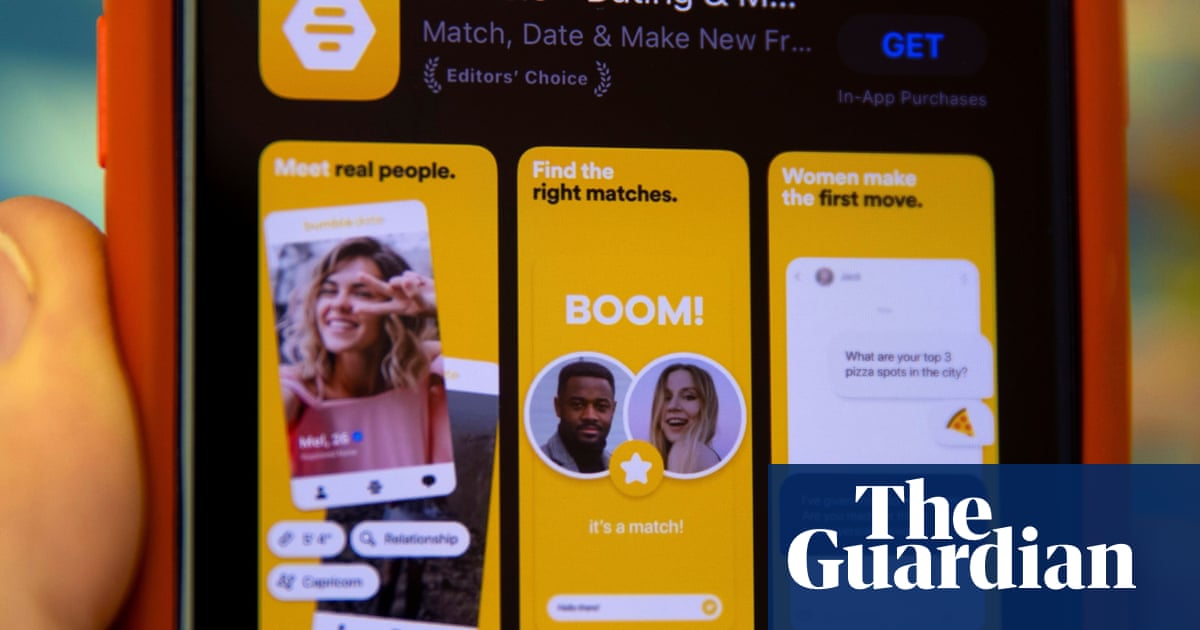
“In the end it was the data that killed me,” says Penny* about her decision to leave the dating app Bumble. If she opened the app she might receive 100 likes, 25% of which she might be interested in. She would look at their profiles and write individualised messages; a few would respond, perhaps one would result in a date.
“That’s a lot of effort to get one date,” she says. “It’s exhausting.”
Bumble, billed as the feminist Tinder when it launched in 2014, this week announced it was taking action to relieve the administrative burden on its female users. It has given them the option of firing off a short pre-written question to potential dates, rather than a carefully crafted missive, after 70% of its female users said they were becoming burnt out.
While it is not ditching the requirement for women to make the first move, its female users can now send a template question such as “What book or film changed the way you think?”, using the site’s Opening Moves feature.
“We have always believed that when you make dating better for women, you make it better for everyone,” said Bumble’s new chief executive, Lidiane Jones. “In listening to our community, many have shared their exhaustion with the current online dating experience and, for some, that includes making the first move.”
Empowerment was “not only about control but it’s also about agency”, she added, which was why Bumble was giving “more choice in how women make the first move”. In a press release the company noted that, during the testing phase, the feature led to higher reply rates and longer conversations.
Research has shown that women spend a lot more time and effort than men when screening potential matches before they swipe right, says Dr Rachel Katz, a digital media sociologist at the University of Salford.
“Given all this extra effort women are making on dating apps in terms of the time and energy spent, it’s an additional expenditure of energy to have to also make the first move,” she says. “I think this adds to the experience of exhaustion that sometimes people describe having with dating apps, particularly women.”
This chimes with Penny’s experience. “I wouldn’t just blanket message people,” she says. “I’d put some effort to show that I’ve read their profile, I’m interested and I’m funny. Then I’d get a ‘Hey’ in response. And I’d put work into that!”
But while billed as a move to help relieve the burden on female users, the move is probably also a reaction to market forces that have led to the biggest players in the dating app world facing significant challenges in recent months.
Bumble, which replaced its founder, Whitney Wolfe Herd, with Jones in January, has experienced an 86% drop in its share price since 2021. The Match group, which owns Tinder, OK Cupid and Hinge, has had similar precipitous drops, after it emerged in November last year that the number of people paying for Tinder had fallen 6% in 12 months.
“You look at share prices and you can see what this move is about in a nutshell,” said one industry insider, who pointed to market saturation and the difficult economic climate. “These are massive corporate machines, they’re making decisions based on figures.”
Bumble also announced it was introducing new “dating intentions” badges – including “intimacy without commitment”, “life partner” and “ethical non-monogamy” – after two-thirds of women it surveyed said they struggled with people not being upfront about what they wanted.
“I think dating apps are beginning to catch up with what’s happening offline,” says Emma Sayle, the founder of the upmarket sex party organiser Killing Kittens, which recently launched its online community and dating site for the “open-minded”, WeAreX. “We’ve been doing this for 19 years, and we’ve seen the explosion in sexuality and gender coming since day one.”
Other dating apps are also increasingly trying to diversify, offering matching services for friendships and events for singles. Figures from Eventbrite show the number of dating or singles events in the UK has doubled since before the start of the pandemic.
But despite warnings of dating app fatigue, the apps’ popularity appears to be holding firm, at least for now. According to the Pew Research Centre, the 30% share of Americans who report using any type of dating site or app is unchanged since 2020. For the under-30s, that figure is 53%.
For the moment, Penny is in no rush to get back to the date-min, even if the work involved is less onerous. “I’m on the lookout for a site where it’s the other person who is putting in all the effort to get my attention,” she says. “I haven’t found it yet.”
*Name has been changed